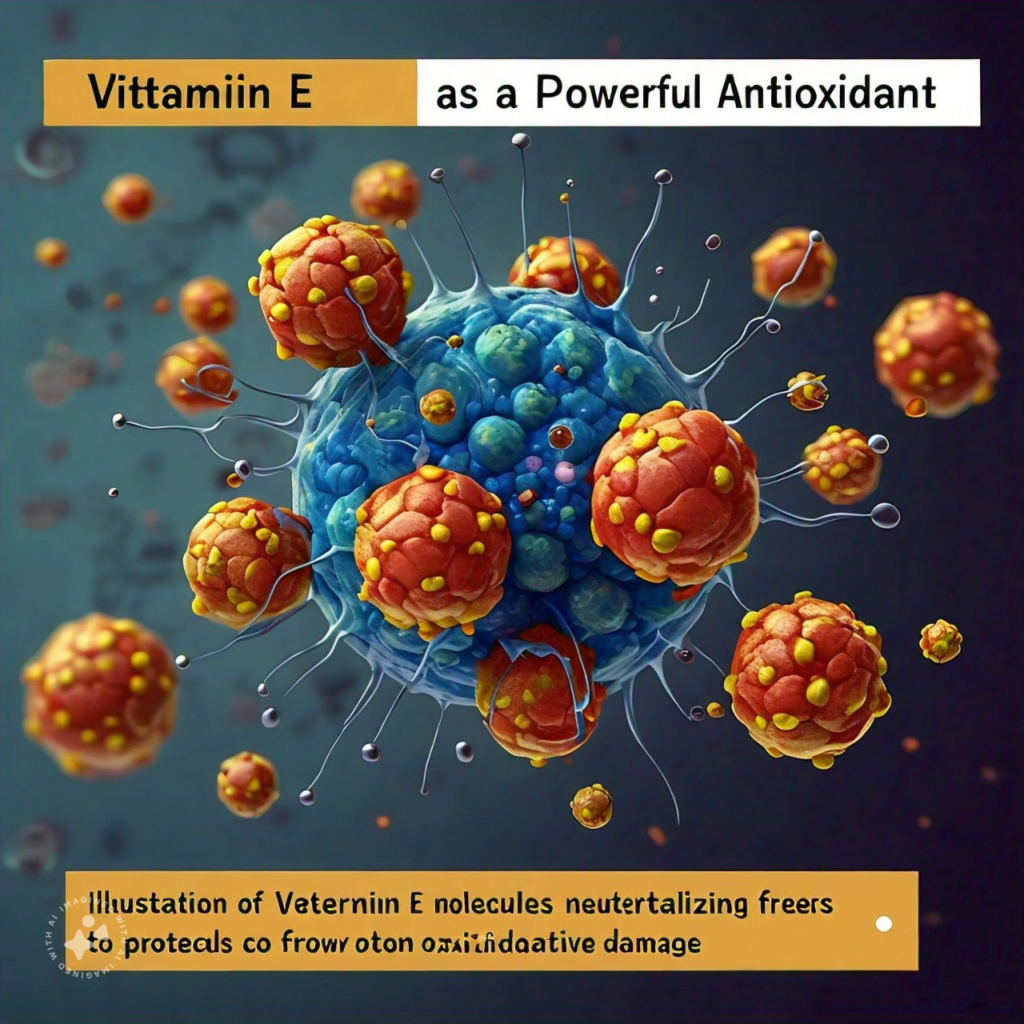
“Vit.E: 10 Surprising Health Benefits”
10 Surprising Health Benefits of Vitamin E
Discover 10 surprising health benefits of Vitamin E for a healthier lifestyle and improved well-being. Learn more at Digital Nest.


Introduction
Overview of Vitamin E
Vitamin E is a fat-soluble nutrient that plays a crucial role in maintaining overall health. Free radicals damage cells due to its powerful antioxidant properties. Various foods such as nuts, seeds, and green leafy vegetables, as well as dietary supplements, contain Vitamin E.
Read also: “10 Flowers with Amazing Health Benefits”

Importance of Vitamin E in the Body
Vitamin E is essential for various bodily functions, including immune system support, skin health, and cardiovascular health. It helps protect cells from oxidative stress, supports healthy skin, and plays a role in maintaining good vision and brain function. Additionally, Vitamin E is important for reproductive health and muscle repair.
Brief Mention of the 10 Surprising Health Benefits
In this article, we will explore 10 surprising health benefits of Vitamin E, including its antioxidant properties, immune system support, skin health benefits, cardiovascular health improvement, eye health enhancement, brain health support, anti-inflammatory effects, muscle repair and growth, reproductive health support, and protection against environmental damage.
Benefit 1: Powerful Antioxidant Properties
Explanation of Antioxidants and Free Radicals
Antioxidants are compounds that help neutralize free radicals, which are unstable molecules that can cause oxidative stress and damage cells. The body naturally produces free radicals, but environmental factors like pollution and UV radiation can also cause them.
How Vitamin E Acts as an Antioxidant
Vitamin E acts as a powerful antioxidant by neutralizing free radicals and preventing them from causing cellular damage. It helps protect cell membranes, proteins, and DNA from oxidative stress, reducing the risk of chronic diseases.
Studies Supporting Antioxidant Benefits
Numerous studies have shown that Vitamin E’s antioxidant properties can help reduce the risk of chronic diseases such as heart disease, cancer, and neurodegenerative disorders. Research indicates that adequate Vitamin E intake is associated with lower levels of oxidative stress and inflammation in the body.

Benefit 2: Supports Immune System
Role of Vitamin E in Immune Function
Vitamin E plays a vital role in supporting the immune system by enhancing the function of immune cells. It helps protect immune cells from oxidative damage and supports their ability to fight infections and diseases.
How It Helps Fight Infections and Diseases
Vitamin E enhances the production of antibodies and improves the function of T-cells, which are essential for the body’s immune response. It also helps reduce inflammation, which can weaken the immune system.
Research on Vitamin E and Immune Health
Studies have shown that Vitamin E supplementation can improve immune function, particularly in older adults. Research indicates that adequate Vitamin E intake is associated with a stronger immune response and a lower risk of infections.

Benefit 3: Promotes Skin Health
Vitamin E’s Role in Skin Repair and Protection
Vitamin E is known for its skin health benefits, including its ability to repair and protect the skin. It helps maintain skin moisture, reduces inflammation, and promotes wound healing.
Benefits for Dry Skin, Scars, and Aging
Vitamin E is effective in treating dry skin, reducing the appearance of scars, and combating signs of aging. It helps improve skin elasticity, reduces the appearance of fine lines and wrinkles, and protects the skin from UV damage.
Topical Applications and Skincare Products
Skincare products like creams, lotions, and serums commonly contain Vitamin E. Topical application of Vitamin E can help soothe and hydrate the skin, reduce inflammation, and promote a healthy complexion.

Benefit 4: Improves Heart Health
Impact of Vitamin E on Cardiovascular Health
Vitamin E plays a significant role in maintaining cardiovascular health by reducing oxidative stress and inflammation. It helps protect the heart and blood vessels from damage and supports healthy blood circulation.
How It Helps Reduce the Risk of Heart Disease
Vitamin E helps prevent the oxidation of LDL cholesterol, which can lead to plaque formation in the arteries. By reducing oxidative stress and inflammation, Vitamin E lowers the risk of atherosclerosis and heart disease.
Studies and Clinical Trials on Heart Health
Research has shown that adequate Vitamin E intake is associated with a lower risk of heart disease. Clinical trials have demonstrated that Vitamin E supplementation can improve cardiovascular health markers, such as blood pressure and cholesterol levels.
Benefit 5: Enhances Eye Health
Importance of Vitamin E for Vision
Vitamin E is essential for maintaining good vision and protecting the eyes from oxidative damage. It helps reduce the risk of age-related eye conditions such as cataracts and macular degeneration.
Protection Against Age-Related Macular Degeneration
Age-related macular degeneration (AMD) is a common eye condition that can lead to vision loss. Vitamin E helps protect the retina from oxidative damage, reducing the risk of AMD.
Research on Vitamin E and Eye Health
Studies have shown that Vitamin E supplementation can help reduce the risk of cataracts and AMD. Research indicates that adequate Vitamin E intake is associated with better eye health and a lower risk of age-related vision problems.
Benefit 6: Supports Brain Health
Role of Vitamin E in Cognitive Function
Vitamin E plays a crucial role in maintaining cognitive function and protecting the brain from oxidative damage. It helps support healthy brain cells and improves overall brain health.
Potential Benefits for Alzheimer’s and Dementia
Research suggests that Vitamin E may have potential benefits for individuals with Alzheimer’s disease and dementia. It helps reduce oxidative stress and inflammation in the brain, which are associated with cognitive decline.
Studies on Vitamin E and Brain Health
Studies have shown that Vitamin E supplementation can improve cognitive function and reduce the risk of neurodegenerative diseases. Research indicates that adequate Vitamin E intake is associated with better brain health and a lower risk of cognitive decline.
Benefit 7: Reduces Inflammation
Anti-inflammatory Properties of Vitamin E
Vitamin E possesses significant anti-inflammatory properties that help reduce chronic inflammation in the body. Numerous health issues, such as arthritis, heart disease, and certain cancers, are associated with chronic inflammation.
How It Helps with Chronic Inflammation and Related Diseases
Vitamin E helps modulate the immune response and reduce the production of inflammatory cytokines. By decreasing inflammation, it can alleviate symptoms of inflammatory conditions and improve overall health.
Research on Inflammation and Vitamin E
Studies have shown that Vitamin E supplementation can reduce markers of inflammation in the body. Research indicates that adequate Vitamin E intake is associated with lower levels of inflammatory biomarkers and improved outcomes in inflammatory diseases.
Benefit 8: Aids in Muscle Repair and Growth
Importance of Vitamin E for Muscle Health
Vitamin E plays a crucial role in muscle repair and growth by protecting muscle cells from oxidative damage. It helps maintain muscle integrity and supports recovery after exercise.
Benefits for Athletes and Active Individuals
For athletes and active individuals, Vitamin E can enhance performance and reduce muscle soreness. It aids in the repair of damaged muscle tissues and promotes faster recovery.
Studies on Muscle Repair and Vitamin E
Research has demonstrated that Vitamin E supplementation can improve muscle strength and reduce exercise-induced oxidative stress. Studies indicate that Vitamin E helps protect muscle cells and supports overall muscle health.
Benefit 9: Supports Reproductive Health
Role of Vitamin E in Fertility and Reproductive Health
Vitamin E is essential for reproductive health and fertility in both men and women. It supports the production of reproductive hormones and protects reproductive cells from oxidative damage.
Benefits for Both Men and Women
In men, Vitamin E can improve sperm quality and motility, enhancing fertility. In women, it supports healthy ovulation and may reduce the risk of complications during pregnancy.
Research on Reproductive Health and Vitamin E
Studies have shown that Vitamin E supplementation can improve reproductive outcomes and support overall reproductive health. Research indicates that adequate Vitamin E intake is associated with better fertility and reproductive function.
Benefit 10: Protects Against Environmental Damage
How Vitamin E Helps Protect Against Pollution and UV Damage
Pollution and UV radiation cause environmental damage to the body, which vitamin E helps protect against. It neutralizes free radicals generated by these environmental factors, reducing oxidative stress and preventing cellular damage.
Benefits for Overall Health and Well-being
By protecting against environmental damage, Vitamin E supports overall health and well-being. It helps maintain healthy skin, reduces the risk of chronic diseases, and promotes longevity.
Studies on Environmental Protection and Vitamin E
Research has shown that Vitamin E can mitigate the harmful effects of pollution and UV radiation. Studies indicate that Vitamin E supplementation can improve skin health and reduce the risk of environmental-related health issues.
Sources of Vitamin E
Natural Food Sources Rich in Vitamin E
There are many different foods that contain vitamin E.
- Nuts (such as almonds and hazelnuts)
- Seeds (such as sunflower seeds)
- Vegetable oils (such as sunflower and safflower oil)
- Green leafy vegetables (such as spinach and broccoli)
- Fortified foods (such as cereals and juices)
Recommended Daily Intake
The recommended daily intake of Vitamin E varies by age and gender. For adults, the recommended daily allowance (RDA) is 15 milligrams (22.4 IU) per day.
Tips for Incorporating Vitamin E into Your Diet
- Include a variety of nuts and seeds in your diet.
- Use vegetable oils for cooking and salad dressings.
- Eat green leafy vegetables regularly.
- Choose fortified foods to boost your Vitamin E intake.

Vitamin E Supplements
When to Consider Supplements
Vitamin E supplements may be considered if you are unable to meet your daily intake through diet alone. They can be beneficial for individuals with certain health conditions or dietary restrictions.
Types of Vitamin E Supplements Available
There are various forms of vitamin E supplements available.
- Natural Vitamin E (d-alpha-tocopherol)
- Synthetic Vitamin E (dl-alpha-tocopherol)
- Mixed tocopherols and tocotrienols
Dosage Recommendations and Safety
It is important to follow dosage recommendations and consult with a healthcare provider before starting any supplement regimen. The tolerable upper intake level (UL) for Vitamin E is 1,000 milligrams (1,500 IU) per day for adults.
Potential Side Effects and Risks
Common Side Effects of Vitamin E
Common side effects of Vitamin E supplementation include nausea, diarrhea, and stomach cramps. These side effects are usually mild and temporary.
Risks of Excessive Intake
Excessive intake of Vitamin E can increase the risk of bleeding and other health issues. High doses of Vitamin E can interfere with blood clotting and may cause hemorrhagic stroke.
Guidelines for Safe Consumption
To ensure safe consumption, stick to the recommended daily intake and avoid exceeding the tolerable upper intake level. Consult with a healthcare provider before taking high-dose supplements.
Conclusion
Recap of the 10 Surprising Health Benefits
- Powerful Antioxidant Properties
- Supports Immune System
- Promotes Skin Health
- Improves Heart Health
- Enhances Eye Health
- Supports Brain Health
- Reduces Inflammation
- Aids in Muscle Repair and Growth
- Supports Reproductive Health
- Protects Against Environmental Damage
Encouragement to Include Vitamin E in Your Diet
Including Vitamin E in your diet can provide numerous health benefits and support overall well-being. By consuming Vitamin E-rich foods and considering supplements when necessary, you can enhance your health and protect your body from oxidative stress and environmental damage.
Final Thoughts on the Importance of Vitamin E for Overall Health
Vitamin E is a vital nutrient that plays a crucial role in maintaining health and preventing chronic diseases. Embrace the benefits of Vitamin E and make it a part of your daily routine for a healthier and more vibrant life.
FAQs
- What are the main benefits of Vitamin E?
- Answer: Vitamin E offers powerful antioxidant properties, supports the immune system, promotes skin health, improves heart health, enhances eye health, supports brain health, reduces inflammation, aids in muscle repair and growth, supports reproductive health, and protects against environmental damage.
- How does Vitamin E act as an antioxidant?
- Answer: Vitamin E neutralizes free radicals, which are harmful molecules that can cause oxidative stress and damage cells. By acting as an antioxidant, Vitamin E helps protect cells from damage and reduces the risk of chronic diseases.
- Can Vitamin E improve skin health?
- Answer: Yes, Vitamin E is known for its skin benefits. It helps repair and protect the skin, reduces the appearance of scars, and combats signs of aging. Because of its moisturizing and healing properties, skincare products commonly use it.
- How does Vitamin E support heart health?
- Answer: Vitamin E helps improve cardiovascular health by reducing oxidative stress and inflammation, which are risk factors for heart disease. It also helps maintain healthy blood vessels and prevents the formation of blood clots.
- What are the best natural sources of Vitamin E?
- Answer: Natural sources of Vitamin E include nuts (such as almonds and hazelnuts), seeds (such as sunflower seeds), vegetable oils (such as sunflower and safflower oil), green leafy vegetables (such as spinach and broccoli), and fortified foods.
- Is it safe to take Vitamin E supplements?
- Answer: Vitamin E supplements are generally safe when taken in recommended doses. However, excessive intake can lead to side effects and health risks. It is important to follow dosage recommendations and consult with a healthcare provider before starting any supplement regimen.
- Can Vitamin E help with cognitive function?
- Answer: Some studies suggest that Vitamin E may support brain health and cognitive function. Further research is necessary to confirm its potential benefits for conditions such as Alzheimer’s and dementia.
- How does Vitamin E reduce inflammation?
- Answer: Vitamin E has anti-inflammatory properties that help reduce chronic inflammation in the body. It can help alleviate symptoms of inflammatory conditions and improve overall health.
- What are the potential side effects of Vitamin E?
- Answer: Common side effects of Vitamin E include nausea, diarrhea, and stomach cramps. High doses of Vitamin E can increase the risk of bleeding and other health issues. It is important to stick to recommended dosages.
- How can I incorporate more Vitamin E into my diet?
- Answer: You can increase your Vitamin E intake by consuming foods rich in Vitamin E, such as nuts, seeds, vegetable oils, and green leafy vegetables. Including these foods in your daily diet can help you meet your recommended daily intake.





One Comment
Pingback: